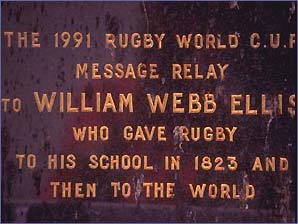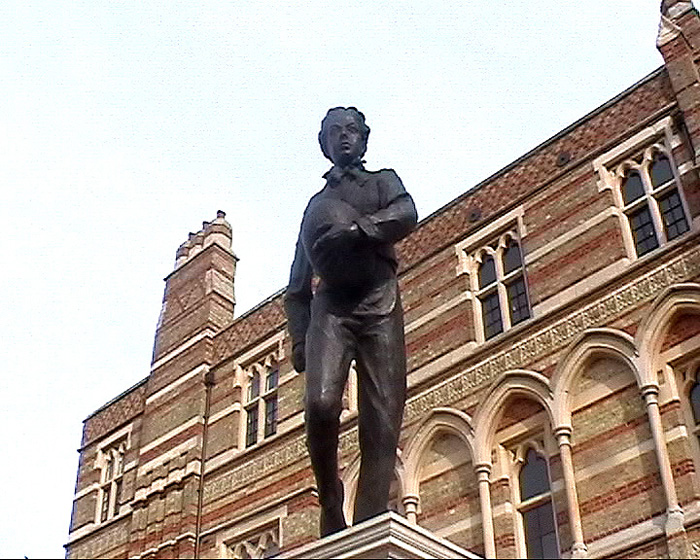Posted by Os Davis in alternate history, football, rugby, soccer | 0 Comments
William Webb-Ellis: Locus of alternate histories
You want to talk what-if scenarios, serious parallel universe-creating moments from the world of sports? Forget relatively trivial stuff like Michael Jordan going to the Portland Trail Blazers in the draft or Harry Frazee taking up the Chicago White Sox’ offer for George Herman Ruth: Go back to 1823 to find a guy that, through simply wanting to gain an advantage in a sports match literally changed world history.
The overwhelming majority of North Americans have never heard the man’s name, despite his literal hand in the creation of three sports currently played and enjoyed by billions. Though he never recorded an official statistic, his effect on the sports universe was a cataclysmic bolt that changed everything. Though his innovation was sometimes called “cheating” by contemporaries, his mode of play now defines leagues all over the world.
Ladies of gentlemen, BuckBokai presents the single most important figure in the history of modern sport itself: William Webb-Ellis!
Webb-Ellis great feat? Well, as the history books and a memorial plaque at the Warwickshire school where he played would have it, the 16-year-old, “with a fine disregard for the rules of football as played in his time first took the ball in his arms and ran with it.”
“Thus,” readeth the legend, “originating the distinctive feature of the rugby game,” which would later serve as father to rugby union and rugby league games and as godfather to American football, in 1823. Association football, a.k.a. soccer, would ultimately see definitive rules hammered out in a London pub in 1863, based firmly around the elimination of the then-growing tendency in the British game to do as Webb-Ellis did.
(I don’t know … picking up the ball and barreling schoolboys over seems like sounder strategy than attempting to advance the ball to guarded teammates with your feet, but BuckBokai’s a 20th-century Yank and thus prone to that sort of thinking. Incidentally, here’s reportedly the only picture of Webb-Ellis in existence. Presumably, that’s not his football uniform.)
Incidentally, as with the Abner Doubleday myth, plenty of debunkers to the grand tale of Webb-Ellis exist. But BuckBokai’ll go with the beautiful tale of individual ingenuity here, methinks.
After all, even if, as critics charge, “the rules were discussed almost every time the boys went out to play and that adjustments were frequently made,” the truth is that unlike Doubleday, actual documentation of Webb-Ellis’ rugby “career” exists.
The truth is, however, that something about *that particular match* in 1823 caught the imaginations of enough organizers and authoritative types to send a few ripples through the rugby web (sorry) at that time. Unfortunately, no records of the game featuring the Webb-Ellis incident exist; such would certainly clear a few things up.
Slightly like the utterly planned fabrication of the Doubleday story (though without the big-business interests, the Webb-Ellis incident is at most a convenience for historians, much like Eddie Cochems or whoever else one chooses to credit with perfecting the forward pass once American football rules were adapted to encourage (not allow creation of!) the rarely-used play.
The certain bit in a pastiche of parallel universe possibilities: What British English terms the “code” (as in the OED definition, “A system or collection of rules or regulations on any subject”) of rugby football would certainly have been properly codified, and certainly within Webb-Ellis lifetime.
Come the Victorian Age, which kicked off 14 years after Webb-Ellis’ disregard for orderly ball, the British suddenly showed a remarkable propensity for organizing and/or creating sports and games. Most popular card games of the 20th century (think bridge, hearts, spades, cribbage, whist, etc.) may garner accolades for The Empire plus hundreds of thousands – maybe millions – of referee types can praise bored Victorians for their livelihoods in soccer, rugby and cricket to name a few.
Had Webb-Ellis not carried the ball on that day, a later attempt of the maneuver may have been disallowed (or encouraged!) in another match. It seems logical in 2010 to suppose that surely someone would have eventually dreamed up Webb-Ellis’ stratagem anyway, but isn’t this a bit of an anthropologist’s trap of interpreting cultures as conveniently based on our sensibilities? With the rules for football games then-permanently in flux, perhaps the run-with-the-ball move would come to dominate such games.
 But who can know? Only a traveler through the multiverse can say with certainty what happens in an existence free of Webb-Ellis and/or his moment of inspiration; considering the worldwide importance of soccer and the ‘Stateside obsession with American football, we can surely surmise that the entire world – not just the sportsworld – would have been decidedly different.
But who can know? Only a traveler through the multiverse can say with certainty what happens in an existence free of Webb-Ellis and/or his moment of inspiration; considering the worldwide importance of soccer and the ‘Stateside obsession with American football, we can surely surmise that the entire world – not just the sportsworld – would have been decidedly different.
So go on out there, enjoy the rugby, soccer or football game and be sure to lift a pint to William Webb-Ellis, key figure in sports history.
(This article extrapolated from a piece previously published at RealFootball365.com.)

